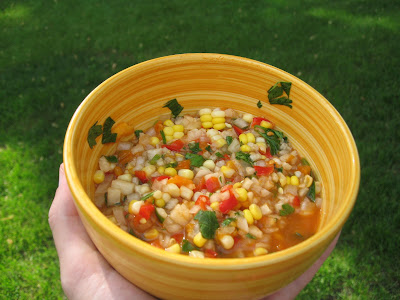
I created this recipe as part of The S. Kitchen presents...Coming Home, which was on Sunday, June 12, 2011 at 3pm at Clare Housing Midtown. The S. Kitchen presents...Coming Home featured Debbie Wyman, my mom, as the guestpert telling her story about why she works at Clare Housing, and organization that provides affordable housing to those living with HIV/AIDS. (To listen to a 15 minute podcast with Debbie about Clare Housing, please click here.)
The food theme was "your favorite childhood foods re-imagined." One of my all time favorite foods is/was roasted corn. I have incredibly fond memories of Minnesotan corn roasted on the grill and eaten right off the cob. The memory still warms me to this day.
For The S. Kitchen, I wanted to do something that incorporated my favorite childhood food while also updating it to include the flavors I love now. I still love simple roasted corn. But I didn't just want to throw it on the grill and call it a day.
A dear friend, Kristine, RSVPed for Coming Home. I met Kristine while I was at the University of St. Thomas, and we worked together for a summer running a summer camp for the YMCA. I will never forget how much Kristine changed my flavor palate. She is the one who introduced me to Puerto Rican food, and ever since I have had a love of all foody things spicy, lime-y and Caribbean/Latin American.
Knowing Kristine was coming I knew that all I had to do was turn corn into an amazingly refreshing Corn Salad that hinted at Caribbean and Latin American flavors. And hey...I live in San Francisco, so it is a fabulous nod to where I call home now as well.
***
What you need:
4 ears of corn (I used yellow corn)
1 jicama (small to mid-sized, peeled
1 red bell pepper, cored and seeded
2 sweet onions (I used Vidalia)
2 (largish) tomatoes (I used orange heirloom tomatoes)
2 jalapenos, cored and seeded
1/2 bunch Italian parsley
3 cloves garlic
2 lemons (I used Meyer lemons)
2 limes (I used key limes)
1 tsp paprika
salt, to taste
What to do:
Roast the corn on the grill on in the oven. It is best to roast the corn and not boil it. I have tried it both ways and the corn tastes best when roasted in its own husk. To roast it on the grill, soak it in a tub full of water for about 15 minutes. Then, roast it on the grill over a medium flame until the husks start to turn deep brown turning occasionally. To roast it in the oven, heat the over to 375 degrees. Place corn in the husks in the oven and roast until the husks start to turn yellow (about 15 minutes). Make sure to turn them over occasionally.
Dehusk the corn and cut the kernels off the corncob.
For the tomatoes, onions, jicama, and red bell pepper it is important to dice everything into really small pieces. They should be slightly smaller than a kernel of corn. Finely dice the jalapeno. Roughly chop the parsley making sure there are both slightly large pieces as well as some finely minced pieces. Crush the garlic. Juice the lemons and limes.
Combine everything together and season with salt and paprika. Let sit refrigerated overnight and enjoy either as a salad, a salsa or as an accompaniment to a main course.
If you would like to kick up the heat a bit, you can add your favorite hot sauce, more jalapenos or a touch of chipotle pepper adobo.



